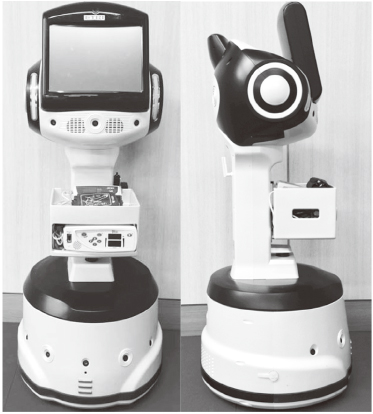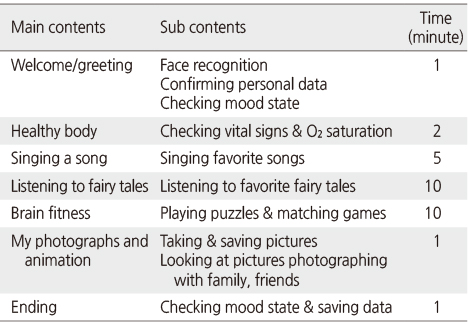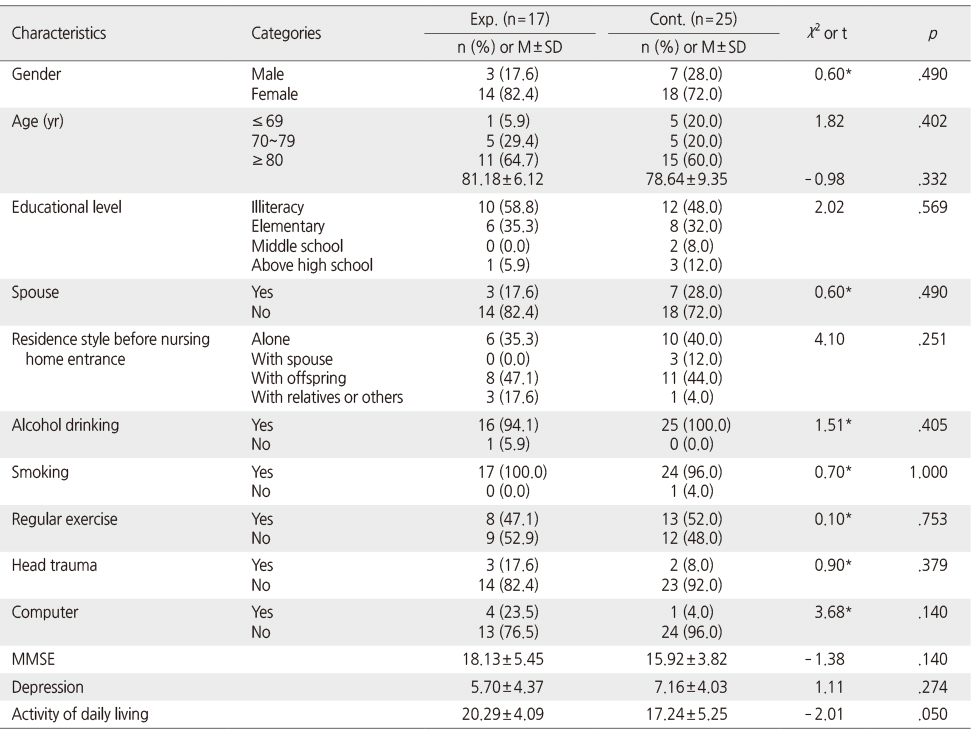Articles
- Page Path
- HOME > J Korean Acad Nurs > Volume 45(3); 2015 > Article
-
Original Article
- Effects of Silver-Care-Robot Program on Cognitive Function, Depression, and Activities of Daily Living for Institutionalized Elderly People
- Jin-Hwan Oh, Yeo-Jin Yi, Chul-Jin Shin, Cheonshu Park, Sangseung Kang, Jaehong Kim, In-Sook Kim
-
Journal of Korean Academy of Nursing 2015;45(3):388-396.
DOI: https://doi.org/10.4040/jkan.2015.45.3.388
Published online: June 30, 2015
1Department of Nursing, Suwon Science College, Hwaseong, Korea.
2College of Nursing, Gachon University, Incheon, Korea.
3College of Medicine, Chungbuk National University, Cheongju, Korea.
4Intelligent Cognitive Technology Research Department, ETRI (Electronics and Telecommunications Research Institute), Daejeon, Korea.
- Address reprint requests to: Yi, Yeo-Jin. College of Nursing, Gachon University, 191 Hambakmeoiro, Yunsu-gu, Incheon 406-799, Korea. Tel: +82-32-820-4217, Fax: +82-32-820-4201, yjyi@gachon.ac.kr
© 2015 Korean Society of Nursing Science
This is an Open Access article distributed under the terms of the Creative Commons Attribution NoDerivs License. (http://creativecommons.org/licenses/by-nd/4.0/) If the original work is properly cited and retained without any modification or reproduction, it can be used and re-distributed in any format and medium.
Abstract
-
Purpose
- The purpose of this study was to identify the effects on cognitive function, depression, and activities of daily living of Silver-Care-Robot Program for institutionalized elders.
-
Methods
- This study was a nonequivalent control group pretest-posttest design. The participants were 42 institutionalized elders (17 in the experimental group and 25 in the control group). The Silver-Care-Robot Program was provided as an intervention which was conducted twice a week for 5 weeks. The Silver-Care-Robot Program is an integrated entertainment program to help the mental, emotional, and physical health of elderly people. Pre-test was conducted on the two groups, and, in order to examine the effects of intervention, a post-test was conducted after 5 weeks.
-
Results
- There were significant differences in cognitive function and ADL (activities of daily living) between two groups after the program. But the difference in depression in the institutionalized elders was not statistically significant between the two groups.
-
Conclusion
- The Silver-Care-Robot Program should be considered as a regular program for cognitive function and activities of daily living for institutionalized elders.
This work was supported in part by the R&D program of the Korea Ministry of Knowledge and Economy (MKE) and the Korea Evaluation Institute of Industrial Technology (KEIT). [KI001836, Development of Mediated Interface Technology for HRI].
- 1. Statistics Korea. Population projections for Korea: 2010-2060 [Internet]. Daejeon, Author. 2011;cited 2014 July 15. Available from: http://kostat.go.kr/portal/english/news/1/9/index.board?bmode=read&aSeq=253456
- 2. Kim HS, Yi YJ, Park KH, Kang UK, Lee B. Effects of cognition promoting program on cognitive function, depression and quality of life in elderly. J Korea Contents Assoc. 2010;10(8):227–239. Article
- 3. Roger K, Guse L, Mordoch E, Osterreicher A. Social commitment robots and dementia. Can J Aging. 2012;31(1):87–94. ArticlePubMed
- 4. Wachtel TJ, Fretwell MD. Kim JS Kim EJ Park M . Practical guide to the care of the geriatric patient. 3rd ed. Philadelphia, PA: Mosby/Elsevier; 2010.
- 5. Lee YM, Park NH. The effects of dementia prevention program on cognition, depression, self-esteem and quality of life in the elderly with mild cognitive disorder. J Korean Acad Adult Nurs. 2007;19(5):787–796.
- 6. Wang MJ. The relations among ADL, self-efficacy, physical activity and cognitive function in Korean elders. J Korean Acad Community Health Nurs. 2010;21(1):101–109. Article
- 7. von Gunten A, Giannakopoulos P, Duc R. Cognitive and demographic determinants of dementia in depressed patients with subjective memory complaints. Eur Neurol. 2005;54(3):154–158. ArticlePubMedPDF
- 8. Park KH, Kim HS, Yi YJ. Comparison of risk factors in cognitive impairment between non-depressive elderly and depressive elderly. J Korea Contents Assoc. 2013;13(7):301–310. Article
- 9. Kim JS. A study on self-esteem, IADL, and life satisfaction in the elderly. J Korean Acad Nurs. 1998;28(1):148–158.ArticlePDF
- 10. Chu SK, Yoo JH, Lee CY. The effects of a cognitive behavior program on cognition, depression, and activities of daily living in elderly with cognitive impairment. J Korean Acad Nurs. 2007;37(7):1049–1060.ArticlePDF
- 11. Ro HL, Hwang KC, Kam JA. Effects of intentional Snoezelen program on activities of daily living and cognitive functions of the demented elderly. J Spec Educ Rehabil Sci. 2011;50(3):393–412.
- 12. Szturm T, Betker AL, Moussavi Z, Desai A, Goodman V. Effects of an interactive computer game exercise regimen on balance impairment in frail community-dwelling older adults: A randomized controlled trial. Phys Ther. 2011;91(10):1449–1462. ArticlePubMedPDF
- 13. Sakairi K. Research of robot-assisted activity for the elderly with senile dementia in a group home. In: SICE 2004 Annual Conference; 2004 August 4-6; Hokkaido Institute of Technology, Sapporo, JP. IEEE; 2004. p. 2092–2094.
- 14. Shibata T, Kawaguchi Y, Wada K. Investigation on people living with Paro at home. In: 2009 RO-MAN: The 18th IEEE International Symposium on Robot and Human Interactive Communication; 2009 September 27-October 2; Toyama International Conference Center, Toyama, JP. IEEE; 2009. p. 1131–1136.
- 15. Lim NY, Kang HS, Park YS, Ahn DH, Oh JH, Song JH. Cognitive function, mood, problematic behavior and response to interaction with robot pet by elders with dementia. J Korean Acad Fundam Nurs. 2009;16(2):223–231.
- 16. Song JH. Effects of a robot pet-assisted program for elderly people with dementia. J Korean Acad Nurs. 2009;39(4):562–573. ArticlePubMed
- 17. Shin HW. Study on integrative development of the contents for play therapy for elderly [dissertation]. Seoul, Korea University. 2009.
- 18. Sheikh JI, Yesavage JA. The geriatric depression scale (GDS): Recent evidence and development of a shorter version. In: Brink TL, editor. Clinical gerontology: A guide to assessment and intervention. New York, NY: The Haworth Press, Inc.; 1986. p. 165–173.
- 19. Song M. Functional assessment of the elderly: Validation of the scale by factor analysis. Seoul J Nurs. 1987;2(1):3–14.
- 20. Stafford RQ, Broadbent E, Jayawardena C, Unger U, Kuo IH, Igic A, et al. Improved robot attitudes and emotions at a retirement home after meeting a robo. In: 2010 RO-MAN: The 19th IEEE International Symposium on Robot and Human Interactive Communication; 2010 September 13-15; Congress Center Il Principino, Viareggio,IT. IEEE; 2010. p. 82–87.
- 21. Jayawardena C, Kuo IH, Unger U, Igic A, Wong R, Watson CI, et al. Deployment of a service robot to help older people. In: 2010 IEEE/RSJ International Conference on Intelligent Robots and Systems; 2010 October 18-22; Taipei International Convention Center, Taipei, TPE. IEEE; 2010. p. 5990–5995.
- 22. Yoon SH, Kim OH, Kim JI, Jang MY, Chae SO, Choi SY. Gerontological nursing. Paju: Soomoonsa; 2010.
- 23. Lee B, Choe J. The effects of audio-visual fairy tale program on linguistic intelligence of elderly people. J Digit Des. 2010;11(1):345–354.Article
- 24. White H, McConnell E, Clipp E, Branch LG, Sloane R, Pieper C, et al. A randomized controlled trial of the psychosocial impact of providing internet training and access to older adults. Aging Ment Health. 2002;6(3):213–221. ArticlePubMed
- 25. Tsai HH, Tsai YF, Wang HH, Chang YC, Chu HH. Videoconference program enhances social support, loneliness, and depressive status of elderly nursing home residents. Aging Ment Health. 2010;14(8):947–954. ArticlePubMed
- 26. Chang S, Kihl T. The effects of music game therapy on cognition function, depression and self-esteem of elderly patients. J Korean Soc Comput Game. 2012;25(3):117–127.
- 27. Moyle W, Jones C, Cooke M, O'Dwyer S, Sung B, Drummond S. Connecting the person with dementia and family: A feasibility study of a telepresence robot. BMC Geriatr. 2014;14:7ArticlePubMedPMCPDF
- 28. Kim HK, Choi ES. Effects of recreational therapy on dementia behavior, affection, and activity of daily living of senile people with dementia. J Korean Acad Adult Nurs. 2005;17(1):44–55.
- 29. Inoue T, Nihei M, Narita T, Onoda M, Ishiwata R, Mamiya I, et al. Field-based development of an information support robot for persons with dementia. Technol Disabil. 2012;24(4):263–271. Article
- 30. Cho CY, Kim HS, Kwon YJ. Development of Montessori-based activities for Korean elderly with demented. J Welf Aged. 2004;26:119–141.
REFERENCES
Figure & Data
REFERENCES
Citations

- Effectiveness of artificial intelligence robot interventions on psychological health in community-dwelling older adults: A systematic review
Yujin Park, Sun Ju Chang, Hee Jung Kim, Ha Na Jeong
Journal of Korean Gerontological Nursing.2024; 26(3): 234. CrossRef - Evaluating Human-Care Robot Services for the Elderly: An Experimental Study
Miyoung Cho, Dohyung Kim, Minsu Jang, Jaeyeon Lee, Jaehong Kim, Woo-han Yun, Youngwoo Yoon, Jinhyeok Jang, Chankyu Park, Woo-Ri Ko, Jaeyoon Jang, Ho-Sub Yoon, Daeha Lee, Choulsoo Jang
International Journal of Social Robotics.2024; 16(7): 1561. CrossRef - Effects of a cognitive-based intervention program using social robot PIO on cognitive function, depression, loneliness, and quality of life of older adults living alone
JunSeo Lim
Frontiers in Public Health.2023;[Epub] CrossRef - Developmental Study on “Smart Silver Care”: A Mobile Application to Alleviate Loneliness in Older Adults within the Community
Hee-Kyung Choi, Kayoung Lee, Seon-Heui Lee
Healthcare.2023; 11(17): 2376. CrossRef - Effects of excretion care with a smart automatic defecation treatment system on skin humidity, Incontinence-Associated Dermatitis, and pressure ulcers of patients with incontinence residing in long-term care facilities: Non-equivalent control group non-sy
Eun-Ju Kim, Eun-Young Kim
Journal of Korean Gerontological Nursing.2023; 25(4): 367. CrossRef - Needs Analysis for Non-Face-to-Face Services among Older Adults to Reduce Loneliness
Hee Kyung Choi, Seon Heui Lee
Healthcare.2022; 10(8): 1576. CrossRef - The Effect of Cognitive Function Health Care Using Artificial Intelligence Robots for Older Adults: Systematic Review and Meta-analysis
Hocheol Lee, Min Ah Chung, Hyeji Kim, Eun Woo Nam
JMIR Aging.2022; 5(2): e38896. CrossRef - A Study on the Effectiveness of IT Application Education for Older Adults by Interaction Method of Humanoid Robots
Sungwook Jung, Sung Hee Ahn, Jiwoong Ha, Sangwoo Bahn
International Journal of Environmental Research and Public Health.2022; 19(17): 10988. CrossRef - The Humanoid Robot Sil-Bot in a Cognitive Training Program for Community-Dwelling Elderly People with Mild Cognitive Impairment during the COVID-19 Pandemic: A Randomized Controlled Trial
Eun-A Park, Ae-Ri Jung, Kyoung-A Lee
International Journal of Environmental Research and Public Health.2021; 18(15): 8198. CrossRef - Can Use of Digital Technologies by People with Dementia Improve Self-Management and Social Participation? A Systematic Review of Effect Studies
David Neal, Floor van den Berg, Caroline Planting, Teake Ettema, Karin Dijkstra, Evelyn Finnema, Rose-Marie Dröes
Journal of Clinical Medicine.2021; 10(4): 604. CrossRef - Development of Dementia-Care-Robot Integrated Program and Evaluation of Effectiveness : For the Elderly with Mild Dementia
Jin Hwan Oh, Hyunghwa Lee, Inhee Chun
Journal of Korea Robotics Society.2020; 15(4): 330. CrossRef - Research on intelligent cognitive function enhancement of intelligent robot based on ant colony algorithm
Yang Jian, Yang Li
Cognitive Systems Research.2019; 56: 203. CrossRef - Factors related to the effectiveness in the use of an ICT-based toy robot for the in-home care of community dwelling elderly
Heui Sug Jo, Ji Hee Kim, Saerom Kim
Korean Journal of Health Education and Promotion.2019; 36(5): 43. CrossRef - Nurses’ Perceptions of Care Robots in Long-term Care Facilities
Eunmin Hong, Sujin Shin
Journal of Korean Gerontological Nursing.2019; 21(1): 22. CrossRef - Community-dwelling older adults’ needs and acceptance regarding the use of robot technology to assist with daily living performance
Yeon-Hwan Park, Hee Kyung Chang, Min Hye Lee, Seong Hyeon Lee
BMC Geriatrics.2019;[Epub] CrossRef - Prospects of Geriatric Nursing Application Based on Robot Technology
Jin Hwan Oh
Journal of Korean Gerontological Nursing.2018; 20(Suppl 1): 127. CrossRef - Effects of Intervention Using PARO on the Cognition, Emotion, Problem Behavior, and Social Interaction of Elderly People with Dementia
In Soon Koh, Hee Sun Kang
Journal of Korean Academy of Community Health Nursing.2018; 29(3): 300. CrossRef - Nurses’ needs for care robots in integrated nursing care services
Jai‐Yon Lee, Young Ae Song, Ji Young Jung, Hyun Jeong Kim, Bo Ram Kim, Hyun‐Kyung Do, Jae‐Young Lim
Journal of Advanced Nursing.2018; 74(9): 2094. CrossRef - Social skills training for children with autism spectrum disorder using a robotic behavioral intervention system
Sang‐Seok Yun, JongSuk Choi, Sung‐Kee Park, Gui‐Young Bong, HeeJeong Yoo
Autism Research.2017; 10(7): 1306. CrossRef - The Effects of a Horticultural Program based on Cox’s Interaction Model on Ability for Daily Life and Depression in Older Patients with Mild Dementia
Mi Jin Yoon, Kyung Mi Sung
The Korean Journal of Rehabilitation Nursing.2017; 20(1): 12. CrossRef - Development of Robot Contents to Enhance Cognitive Ability for the Elderly with Mild Cognitive Impairment
Yean-Hwa Lee, Kab Mook Kim, Tin Trung Tran, Jong-Wook Kim
Journal of Korea Robotics Society.2016; 11(2): 41. CrossRef

Figure 1
Contents of Silver-Care-Robot Program
Homogeneity Test of General Characteristics and Dependent Variables (N=42)
*Fisher's exact test; Exp.=Experimental group; Cont.=Control group; MMSE=Mini-mental state examination.
Comparison of MMSE, Depression, and Activity of Daily Living (N=42)
*Measured by ANCOVA with pre-test score as covariates; Exp.=Experimental group (n=17); Cont.=Control group (n=25); MMSE=Mini-mental state examination.
*Fisher's exact test; Exp.=Experimental group; Cont.=Control group; MMSE=Mini-mental state examination.
*Measured by ANCOVA with pre-test score as covariates; Exp.=Experimental group (n=17); Cont.=Control group (n=25); MMSE=Mini-mental state examination.
 KSNS
KSNS
 E-SUBMISSION
E-SUBMISSION




 Cite
Cite

